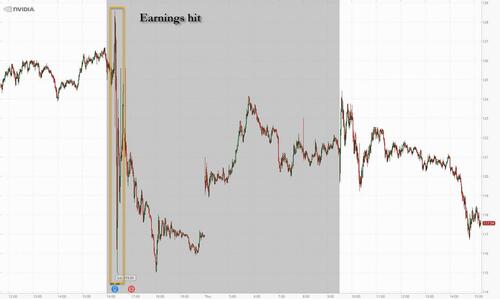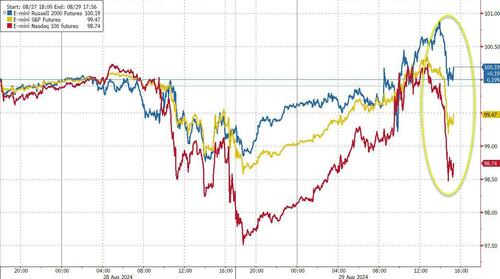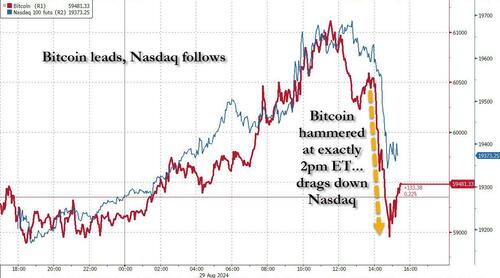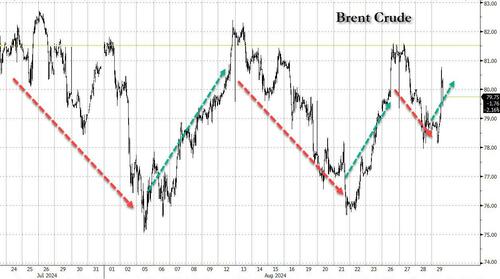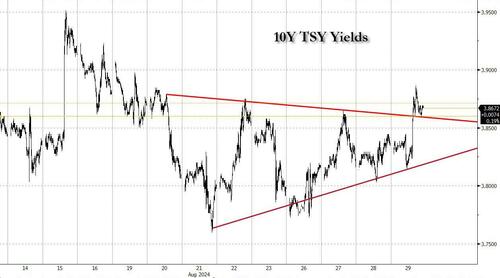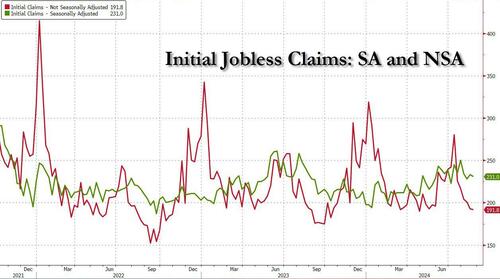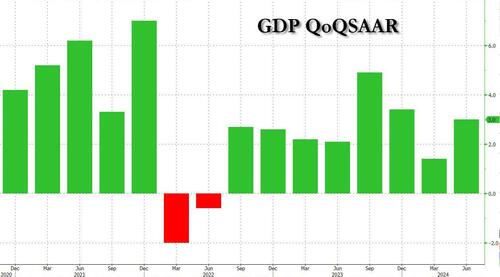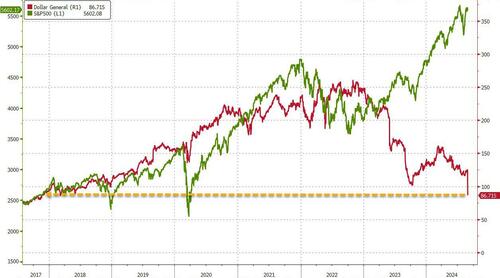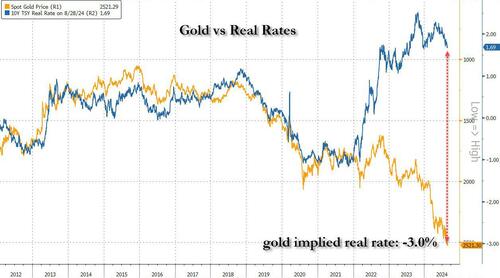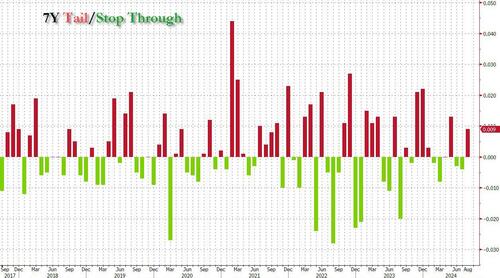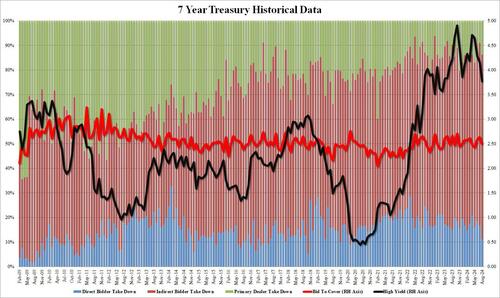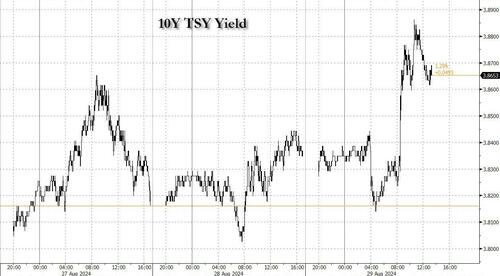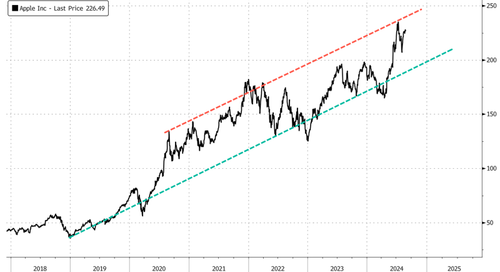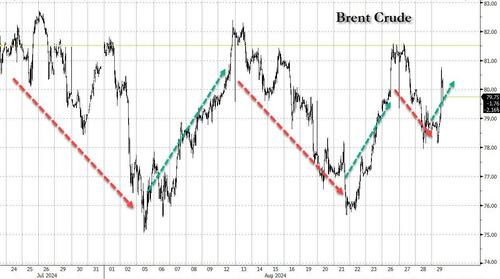By Michael Every of Rabobank
Invidious
Headlines today are of disappointing earnings at NVIDIA. Yet somehow world markets –and the world economy aside from one firm, in one sector, in one country– managed to survive, and we didn’t see a complete meltdown. The neoliberal ‘Too-Big-To-Fail-is-how-we-succeed’ system needs to try harder to create the Perfect Storm; I’m sure it will, while central banks and central bank-watchers jawbone about 2% inflation and financial stability. Meanwhile, related systemic storms are brewing.
In Tuesday’s ‘The Powell of the Powerless’, I pointed out the dangers of a global system in which the Fed not only ‘understands’ complex reality with internally inconsistent, secular-religion ideology, but believes it creates it. Today, I stress the same solipsistic hubris is institutional in geopolitics, which presents terrifying fat tail risks as bad as a burst bubble or Fed policy error.
US national security advisor Sullivan is in Beijing to smooth relations. As recently noted, he said the Middle East was the quietest it had been for two decades just prior to October 7. His team appeases Iran, allowing Tehran’s proxies to expand regionally: the result has been the closure of the Suez Canal to many, the defeat of the US Navy in reversing it, and now a potential Red Sea environmental disaster after the Houthis blew up a European oil tanker. Before that, we had the US failure to prevent Russia invading Ukraine. Before that, the panicked US withdrawal from Afghanistan. Yes, we also got the low-hanging fruit of Europe, Japan, and Australia nodding to US words while spending little on defense, and the berry of the Philippines reinvigorating its mutual defense pact with the US. However, as a US Navy admiral says it will escort Filipino vessels in the South China Sea against possible Chinese actions, a long-run lack of investment meaning more time in drydock and strife in the Middle East means the US doesn’t have an aircraft carrier in the Indo-Pacific, should it need one.
As @AndrewBadger_ notes, “What we are seeing -in real time- is a violation of the fundamental principle of sound grand strategy: that ends (aspirations) are in line with means (capabilities).” He quotes Yale Professor Gaddis, an expert on this topic: “Because ends only exist in the imagination, they can be infinite… Means, though, are stubbornly finite: they’re boots on the ground, ships in the sea, and the bodies required to fill them. Ends and means have to connect if anything is to happen. They’re never, however, interchangeable.” Put simply, this is a national security mirror image of the Fed’s – and again it’s institutional.
Though most current US foreign policy experts are politically 180 degrees removed from the neocon, neoliberal hubris of George W Bush’s presidency, whose policy advisor Rove stated, “We’re an empire now, and when we act, we create our own reality,” they still exhibit exactly the same ideologically-closed minds and self-confidence, just in different ways. Of course, they can’t see it, which is why they can’t course correct – but others do.
As @davidpgoldman notes, “A Chinese PhD grad of a US university takes the measure of the US foreign policy elite at “The Observer.” The hottest topics in contemporary international relations are “human rights” and “environmental protection”, rather than “war” and “country”… When our old professor who studied Russia taught a Russian studies course for the last semester before his retirement, I was the only one in the department who signed up. A classmate even asked me in surprise, “Ah? Does anyone still care about this topic?””
Sadly, very few in US academia do; nor think tanks; nor political circles; nor power circles. Few even study history or philosophy, nor Russian, Chinese, or Farsi, assuming Google Translate gives insight into others’ thoughts – that as those countries produce experts who speak fluent English and understand Western economies and societies intimately. Goldman summarises that in the US: “This is an elite that believes whatever they say is real is actually real.”
Taking a naïve/hubristic geopolitical approach presents staggering fat tail risks. And reality always wins out over those who think they can create it in the end: it already is, if you look at the chaos.
The US will have to spend far more and more efficiently ahead to avoid increasing geopolitical tail risks, regardless of its deficit and debt. As geostrategist Harald Malmgren pointed out yesterday, capital investment aside –and too much of it has been put aside for too long– the Pentagon spends what it needs to on its real time, then this shows up in the following year’s defence budget. Do you think all the current military build-up in the Middle East comes for free? We won’t even know the fiscal damage for around another year.
But if you think this is a US issue, it’s infinitely worse elsewhere. The US, the EU, UK, NATO allies, Japan, and South Korea are in a far worse starting position. There will have to see far larger increases in defence spending to help fill US gaps.
Moreover, if the US doesn’t spend more, or becomes more isolationist, then expect more articles like the one from Hal Brands today arguing ‘If South Korea Goes Nuclear, So Will the World’. That’s not just a hair-raising thought – it’s hair-raisingly expensive. In Europe, Poland just boosted its 2025 defence budget to 4.7% of GDP. Now imagine the cost of going nuclear, should the rest of Europe want to move beyond the small French umbrella, which few outside it are convinced actually covers them in a crisis. For all of Europe, it’s either massive military-spending increases to keep the US onside, or to defend itself if the US is off its side – with major macro and market spillover effects; or it sees massive geopolitical and geoeconomic decline – with major macro and market spillover effects.
Globally, the systemic hubris of central banks who ‘don’t do geopolitics’ is challenged by this realpolitik. The history of central banking is intimately linked to that of war because it’s so staggeringly expensive, and important. The systemic hubris of geopolitical experts who ‘don’t do central banks’ (or “war” or “country”) will be challenged too. The history of geopolitics should always intimately linked to that of war, because it’s so staggeringly expensive to get it wrong.
As such, the heuristic still says it’s a question of if, not when, complex reality supplants internally inconsistent, secular-religion ideologies at US think tanks and the Fed in favour of something more pragmatic,…and fiscally AND monetarily expansionary – at least for the government / military, if no one else.
Yes, such looming fat tail risks are hard to price for in a financial economy. However, in the physical economy, CEOs have no such excuse. Neither do politicians, much as they may try. Nor central banks, who are there for a reason, or have no reason to be there. So, while the financial markets will happily look away for now, those acting last in this regard will eventually be punished as hard as those acting first today.
This is all not so much “NVIDIA!” as invidious. Life is simpler when all you have to worry about is once-a-quarter earnings from one firm; but such secular religion offers purgatory, at best, not anything heavenly
